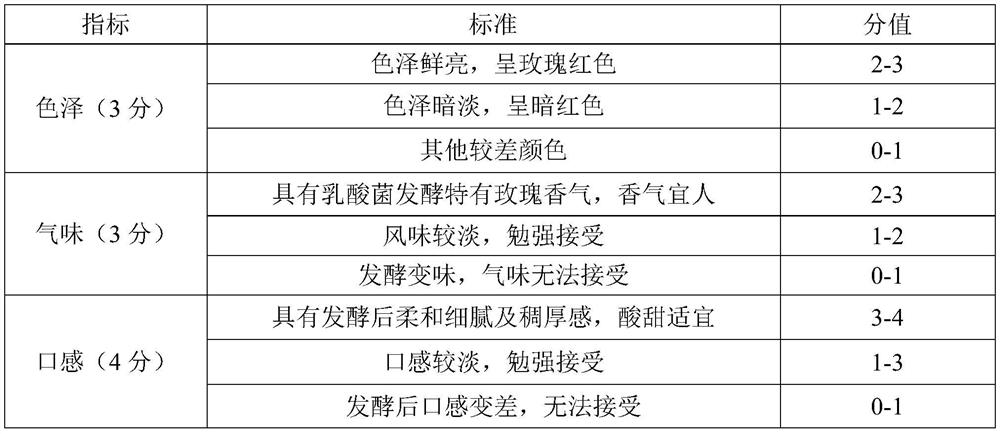Application of a strain of Lactobacillus plantarum in the preparation of lactic acid bacteria rose flower fermented beverage
A technology of Lactobacillus plantarum and fermented beverages, which is applied in the field of Lactobacillus plantarum in the preparation of lactic acid bacteria rose fermented beverages, can solve the problems of bitterness and astringency, achieve bright red color, good effect of removing bitterness, and increase drinkability
- Summary
- Abstract
- Description
- Claims
- Application Information
AI Technical Summary
Problems solved by technology
Method used
Image
Examples
Embodiment 1
[0040] This example is used to illustrate the application of plantarum lactobacillus provided by the present invention in the preparation of lactic acid bacteria rose flower fermented beverage.
[0041] (1) Preparation of dried rose flowers: select double-petaled roses, and use microwave low-temperature drying technology to prepare them into dried rose flowers with a moisture content lower than 5 wt%.
[0042] (2) Strain activation: inoculate 0.5 g of cryopreserved Lactobacillus plantarum L. plantarum HM60C1 into 30 g of improved MRS liquid medium, culture at a temperature of 37° C. for 20 h, and subculture in this way for 3 times to obtain an activated bacterial liquid; The modified MRS liquid medium was prepared as follows: 10g peptone, 5g beef extract, 4g yeast extract powder, 20g corn extract, 20g glucose, 2g dipotassium hydrogen phosphate, 5g sodium acetate, 2g trisodium citrate, 0.5mL Add Tween 80, 2g of magnesium sulfate, and 0.05g of manganese sulfate into 1000mL of di...
Embodiment 2
[0047] This example is used to illustrate the application of plantarum lactobacillus provided by the present invention in the preparation of lactic acid bacteria rose flower fermented beverage.
[0048] (1) Preparation of dried rose flowers: select double-petaled roses, and use microwave low-temperature drying technology to prepare them into dried rose flowers with a moisture content lower than 5 wt%.
[0049] (2) Strain activation: inoculate 0.5 g of cryopreserved Lactobacillus plantarum L. plantarum HM60C1 into 30 g of improved MRS liquid medium, culture at a temperature of 37° C. for 20 h, and subculture in this way for 3 times to obtain an activated bacterial liquid; The modified MRS liquid medium was prepared as follows: 10g peptone, 5g beef extract, 4g yeast extract powder, 20g corn extract, 20g glucose, 2g dipotassium hydrogen phosphate, 5g sodium acetate, 2g trisodium citrate, 0.5mL Add Tween 80, 2g of magnesium sulfate, and 0.05g of manganese sulfate into 1000mL of di...
Embodiment 3
[0054] This example is used to illustrate the application of plantarum lactobacillus provided by the present invention in the preparation of lactic acid bacteria rose flower fermented beverage.
[0055] (1) Preparation of dried rose flowers: select double-petaled roses, and use microwave low-temperature drying technology to prepare them into dried rose flowers with a moisture content lower than 5 wt%.
[0056] (2) Strain activation: inoculate 0.5 g of cryopreserved Lactobacillus plantarum L. plantarum HM60C1 into 30 g of improved MRS liquid medium, culture at a temperature of 37° C. for 20 h, and subculture in this way for 3 times to obtain an activated bacterial liquid; The modified MRS liquid medium was prepared as follows: 10g peptone, 5g beef extract, 4g yeast extract powder, 20g corn extract, 20g glucose, 2g dipotassium hydrogen phosphate, 5g sodium acetate, 2g trisodium citrate, 0.5mL Add Tween 80, 2g of magnesium sulfate, and 0.05g of manganese sulfate into 1000mL of di...
PUM
 Login to View More
Login to View More Abstract
Description
Claims
Application Information
 Login to View More
Login to View More - R&D
- Intellectual Property
- Life Sciences
- Materials
- Tech Scout
- Unparalleled Data Quality
- Higher Quality Content
- 60% Fewer Hallucinations
Browse by: Latest US Patents, China's latest patents, Technical Efficacy Thesaurus, Application Domain, Technology Topic, Popular Technical Reports.
© 2025 PatSnap. All rights reserved.Legal|Privacy policy|Modern Slavery Act Transparency Statement|Sitemap|About US| Contact US: help@patsnap.com



